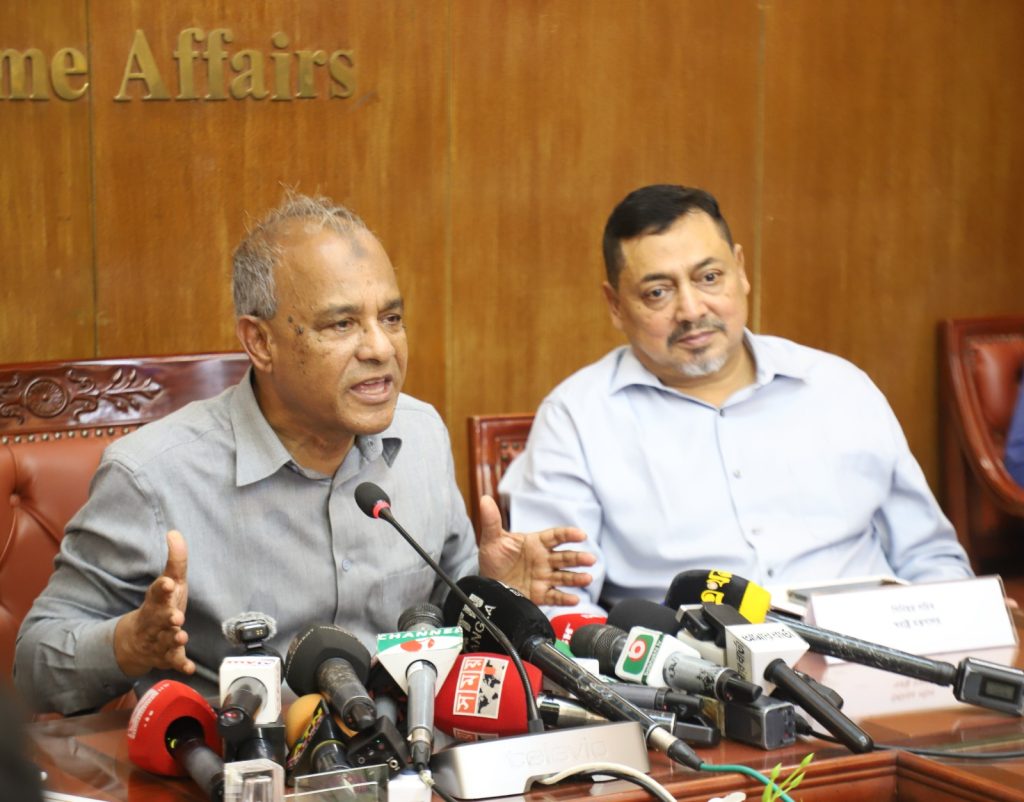It has been a full year since the interim government, led by Muhammad Yunus, took office on 8 August 2024, amid soaring public optimism for structural reforms and improved public safety.
Yet experts say a glaring gap remains between these aspirations and the ground reality- law and order remain disturbingly fragile.
Despite repeated assurances, incidents of mob violence, extortion, gender-based violence, robbery, and youth gang activity persist across the country.
According to police statistics, from August last year to June 2025, a staggering 3,504 killings were recorded nationwide, including 345 in Dhaka.
The highest monthly toll came in Au- gust 2024 alone, with 626 murders – 119 in the capital. Robberies further added to the grim record, with 1,587 inci- dents reported nationally and 345 in Dhaka.
When pickpocketing and petty theft are considered, the figures climb even higher. Kidnappings numbered 805 across Bangladesh, including 225 in the capital. Violence against women and children was particularly shocking.
In Dhaka alone, there were 1,505 reported cases, while the national figure stood at a staggering 17,900 However, experts say many incidents go unreported due to pressure from influential locals, fear of retaliation, or informal settlements brokered outside the legal system.
One particularly brutal incident occurred on Thursday night when journalist Tuhin was murdered in broad daylight in Gazipur’s Chandna Chowrasta.
A murder case was filed naming 20 to 25 unknown suspects, and police later arrested five individuals. This episode echoes the violence seen during the Awami League’s rule, In Old Dhaka, businessman Sohag was publicly beaten and killed with a stone – a chilling reminder of the infamous Biswajit Das killing.
In Cumilla, a mother, son, and daughter were lynched by a mob. Other violent incidents include a youth leader’s tendons severed in Khulna, an imam attacked with a machete in-side a mosque in Chandpur, and multiple mob killings in Narsingdi, Tongi, and Uttara.
These incidents followed rumours of Sheikh Hasina’s flight to India, which triggered violent unrest in several prisons. Arms, ammunition and even death-row convicts were reportedly freed, many believed to have joined militant outfits.
Meanwhile, unreturned licensed weapons distributed during the Awami League’s 17-year rule are now feared to be in criminal hands. Juvenile gang activity remains rampant in Mohammadpur, Adabar, Uttara, Dhanmondi, and Wari.
Street-level robberies occur openly. In one instance, a gold trader in Banashree was shot and robbed of 200 tolas of gold and Tk 100,000. The culprits remain at large. Public outrage erupted after Mohammadpur police allegedly refused to act, prompting demands for the officer-in-charge’s removal.
On the judicial front, the Ministry of Law claims nine re- forms have been initiated, including easing case backlogs, recruiting over 5,000 legal officers, and strengthening legal aid.
More than 15;000 politically motivated cases have report- edly been withdrawn, including 700 false cases filed during the July 2024 uprising, according to a law ministry report published Thursday.
Yet systemic problems persist. Senior Supreme Court Lawyer Barrister Omar Farooq told TIMES of Bangladesh that the backlog now exceeds 4.5 million cases, with no significant acceleration in the judicial process. “Barriers to justice remain deeply entrenched,” he said.

Former inspector general of police Nurul Huda said, “During the July Uprising, around 1,200 to 1,400 people were killed, and 7,000 to 8,000 got injured. “Given the scale, things could have been far worse. Credit must go to the people who showed restraint. But in many cases, they could not.”
He noted that mob violence has become more prominent due to constraints on law enforcement. “There has been some improvement recently, but the issue re- mains serious,’ he added.
A Transparency International Bangladesh (TIB) report released on 4 August, highlighted continued deterioration in the rule of law. The report cited persistent issues, including killings, thefts, arson, looting, and impunity.
It accused the po- lice of apathy, professional incompetence, and questioned the capacity of law enforcement agencies Although the police force has seen mass reshuffles – transfers, promotions, and removals no meaningful – institutional reform or capacity enhancement has followed.
The prevalence of mob justice, custodial deaths, and extrajudicial actions has severely damaged public trust. Over 761 complaints, were filed against police personnel over the past 11 months. Despite several high-profile arrests, confidence in law enforcement remains fragile. Citizens say security was the core expectation following the “July Revolution” – a hope they now fear is unfulfilled.
A senior deputy inspector general (DIG) acknowledged the enormity of the challenge, claiming law enforcers have worked tirelessly amid chaos.
Dhaka Metropolitan Police’s Assistant Deputy Commissioner (Administration), Main Uddin Chowdhury reported 707 murder cases across 50 police stations, with 5,079 arrests, including ministers, lawmakers, and 23 police officers, among them two former Inspector Generals.
Professor Muhammad Omar Farooq of Mawlana Bhashani Science and Technology University criticised the release of suspected criminals without assessing risks.
“Law and order situation have not improved. The police abandoned enforcement after the Awami League’s collapse. That vacuum allowed criminals and radical ‘elements-to re-group,” he said. In contrast, the interim government’s Press Secretary Shafiqul Alam marked the one-year milestone by listing 12 achievements on social media. He claimed the country has stabilised post-uprising, with vengeance and chaos coming to an end
But for many citizens, especially those in vulnerable neighbourhoods, such claims offer little consolation. The demand for security remains unmet and the promise of a new, safer Bangladesh remains a distant goal.


